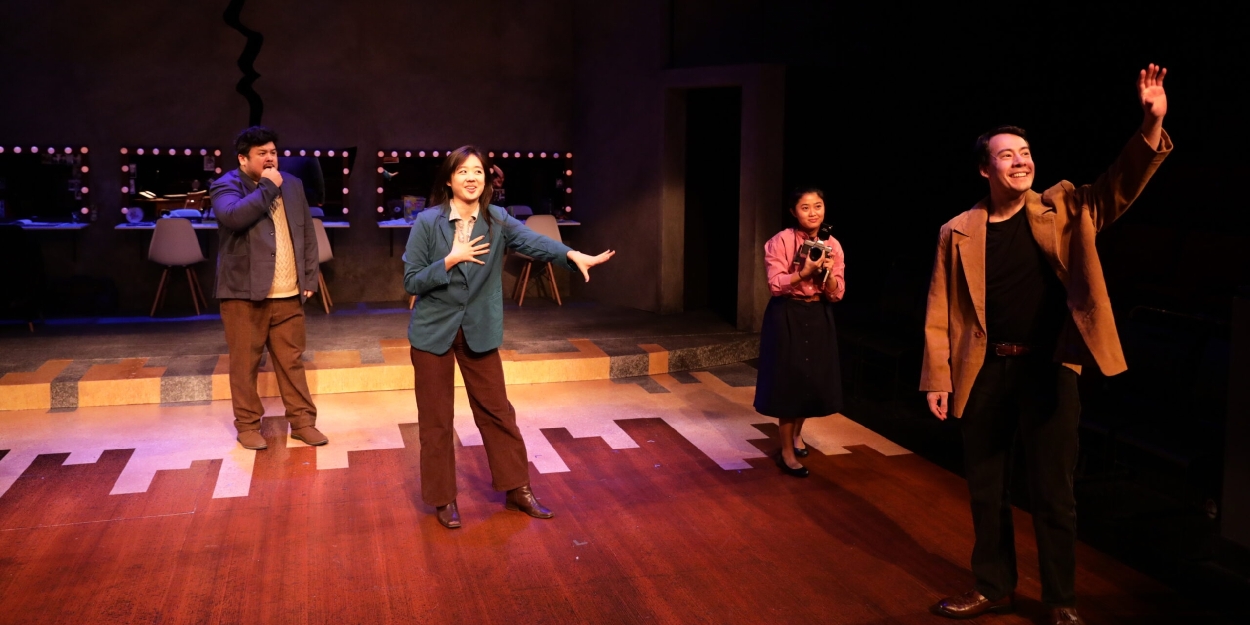Review: Lyric Stage Company Of Boston's YELLOW FACE is a Head on Look at Fallout of Miscasting
The production runs through June 23 at the Lyric Stage Boston

There was considerable excitement surrounding the pre-Broadway world-premiere production of David Henry Hwang’s “Face Value” when it opened at Boston’s Colonial Theatre in early 1993.
The playwright’s “M. Butterfly” had won the 1988 Tony Award win for Best Play and earned him widespread acclaim.
The buzz quickly faded, however, and the comedy collapsed, closing in previews without ever opening on Broadway. Hwang survived that potential career catastrophe, though, by using it as the inspiration for his 2007 semi-autobiographical comedy “Yellow Face,” now being given an entertaining and thought-provoking production by Lyric Stage Company of Boston through June 23.
The Broadway premiere of the play – starring Daniel Dae Kim (TV’s “Hawaii Five-O,” “Lost”) – will be presented by New York’s Roundabout Theatre Company at the Todd Haimes Theatre beginning in September.
Inspired by Hwang’s real-life leadership of the protests of the casting of Welsh actor Jonathan Pryce to play the Eurasian Engineer in the original Broadway production of “Miss Saigon,” Hwang’s seriocomic play has DHH – as his character is known – publicly expressing his outrage for what he says is “yellowface” in Pryce’s casting in the musical.
Under the knowing direction of Ted Hewlett, and with a wonderfully wrought, sometimes comically overwrought, performance by the expressive-faced Michael Hisamoto, “Yellow Face” manages to generate laughs from the serious issues of race and assimilation, all while demonstrating how well-meaning intentions can go seriously awry.
At the outset, we learn that DHH has found himself in the muck and mire that comes from his own careless attempt at mixed-race casting. Indeed, DHH wants to hire an actor by the name of Marcus G. Dahlman – played with disarming charm by Alexander Holden – on the basis of what he sees as a strong audition. It doesn’t seem to bother him one bit that the role calls for an Asian performer to appear in whiteface in a protest scene against “Miss Saigon.”
That provided the play’s clear throughline – what happens when a well-known, well-respected playwright, as Hwang was coming out of his success with “M. Butterfly,” misleads his audience – convincing himself a white actor is of Asian descent, at least in part anyway, and then sitting by as that fiction leads to the actor’s career ascent.
DHH’s ego and eagerness to get what he wants lead him to chastise his lead producer for suggesting that Marcus has no Asian features, which will likely confuse audiences when he removes the whiteface makeup only to still be white. “Asian faces come in all shapes and sizes, just like any other human beings,” DHH proclaims.
The playwright doth protest too much and too soon, however. Marcus G. Dahlman has dropped his last name, becoming Marcus G. and landing the lead role in a touring production of “The King and I.” Initially standing by the star he helped create, DHH invokes the name of half-Filipino, half-American actor Lou Diamond Phillips – star of the 1996 revival of “The King and I” – to defend G’s casting as the King of Siam.
Hisamoto and Holden make strong scene partners, playing on their characters’ polar-opposite personalities – DHH high-strung and easily frustrated, and G zen and roll-with-the-punches placid.
Much of the second act involves the more personal, emotional side of DHH’s life, and his high-powered banker father’s entanglement in alleged money funneling that reaches the level of U.S. Senate hearings before the elder Hwang is ultimately vindicated.
J.B. Barricklo is terrific as the father, making the character appealingly relatable in the first act, and bringing out the character’s complexities and depth in act two when he unwittingly finds himself on the wrong side of the law and has his belief in the American Dream badly shaken.
Fine work in multiple roles is also contributed by Jenny S. Lee, Jupiter Lê, and Mei MacQuarrie, each highly versatile and interesting to watch.
The play’s conclusion includes a revelation that may not surprise anyone with clear memory of “Face Value,” but will likely dishearten others.
Szu-Feng Chen’s scenic designs make full, imaginative use of Lyric’s compact stage and greatly aid in carrying the action forward. Megan Reilly’s creative projection designs include headlines from the various events and periods in DHH’s life. Longtime Boston theatergoers will likely get a kick out of seeing “Face Value” reviews by Carolyn Clay and the late Kevin Kelly flash by.
Photo caption: Michael Hisamoto, Jenny S. Lee, Mei MacQuarrie, and Alexander Holden in a scene from the Lyric Stage Company of Boston’s production of “Yellow Face.” Photo by Mark S. Howard.
Reader Reviews

Videos

